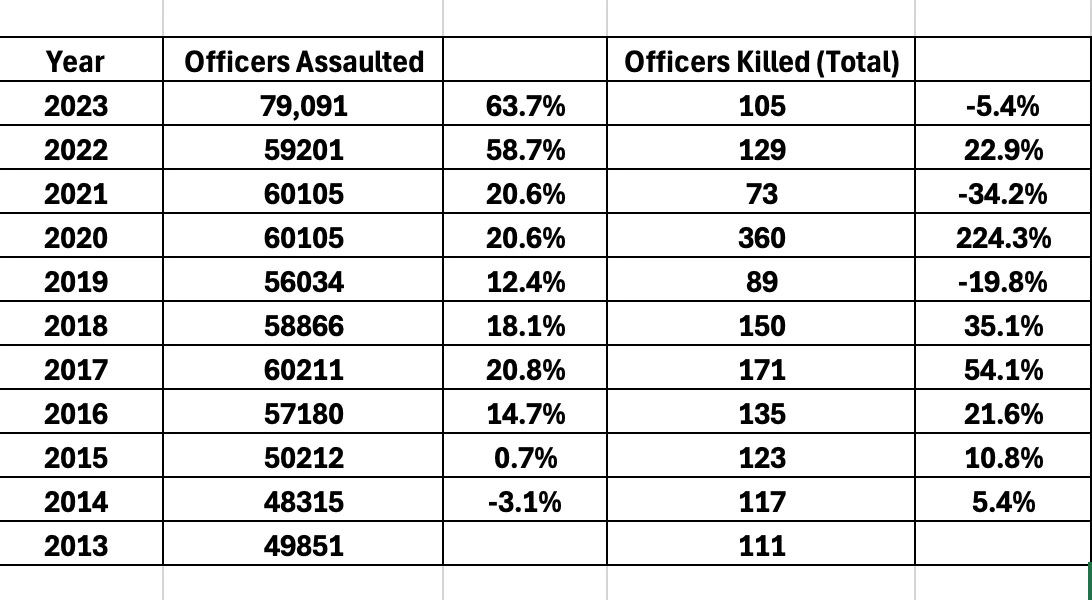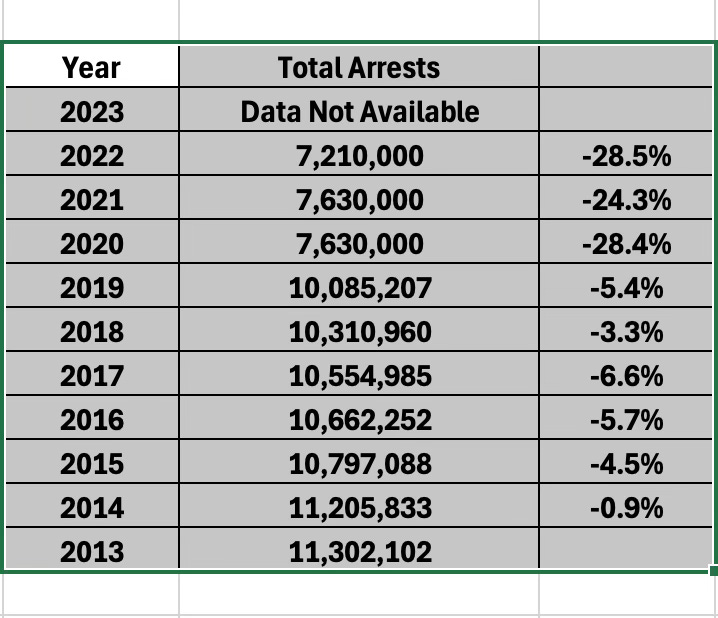Alarming Trends Show Officer Attacks Up 64% Amid a 29% Decline in Arrests in the last 11 Years
Exploring the Rising Threats to Law Enforcement as Arrest Rates Drop and Officer Attacks and Fatalities Surge

Although it is well-documented and evident that attacks on officers—and those resulting in fatalities—have increased over the past ten years, this remains one of the more challenging areas of research. Consider my recent search term: escalating violence against police officers. The first thirty responses had nothing to do with attacks on police and dealt mainly with recent campus protests.
FBI doesn’t collect complete data
But there is another wrinkle. The FBI relies on reports from participating agencies as they report: “In 2023, 10,884 agencies employing 600,120 officers reported 79,091 assaults of officers, indicating a rate of 13.2 assaults per 100 officers. This is the highest officer assault rate in the past ten years, exceeding the second highest rate of 12.7 assaults per 100 officers reported in 2019.” Other FBI reports state, “… there are more than 18,000 local police departments in the United States. These departments are subject to different state, county, and city laws and codes, and they have different policies, practices, and officer training programs. There is no universal standard for the structure, size, or governance of police departments in the United States.”
The data existed and would eventually be discoverable, but I never expected it to be as dreadful as I discovered. While the population of the United States from 2013 to 2022 increased by 17,158,718, annual arrests dropped by 29%. During this same period, officer assaults have increased by 64%. And since this is report is based on at least 7,000 agencies less than the FBI and the Bureau of Justice Statistics estimate exist in this country it is likely more. Gun violence toward officers more than doubled too: “Agencies reported 466 assaults with firearms in 2023, which is the highest level in a decade, FBI officials said. That’s up from less than 200 officers assaulted and injured by guns in 2014.”
We all hope that it was just small agencies where nothing happened that failed to voluntarily report to the FBI. However, “more than 6,000 law enforcement agencies were missing from the FBI’s national crime data last year, representing nearly one-third of the nation’s 18,000 police agencies. This means a quarter of the U.S. population wasn't represented in the federal crime data last year, according to The Marshall Project’s analysis.” WGN reports in 2021: “The New York City and Los Angeles police departments are among the 40% of law enforcement agencies nationwide not sharing their 2021 crime data with the FBI.” The transition to incident-based reporting was approved at a Uniform Crime Reporting conference in March of 1988 when Ronald Reagan was president.
During this research process, a deputy sheriff was murdered in a nearby county and on the same scene, another deputy was critically injured. Some of my best friends are serving in that county. Society suffers a moral injury when one of their protectors dies fighting criminals. It revived memories of the 2017 killing of one of my friends who died in a gunfight with a murderer sparking a massive nine-day manhunt. In the first hours of that manhunt, a motorcycle deputy was tragically killed in a traffic crash.
Policing is risky and dangerous
Policing is a dangerous profession, but it is far from the most dangerous job in the world. There are linesmen, roughneck wildcatters, and underwater welders as well as scientists conducting gain-of-function research in virology institutes who, by the nature of their work face a torrent of life-threatening violent seas, venom, voltage and viruses. The risks are different in policing.
Being murdered, and being murdered by being ambushed, by the actions of criminals reflect a large portion of the death risk of an officer doing their job. Car crashes in pursuits and responding to calls are also unique professional risks that have the best potential for reform and reduction.
The executive summary of the FBI Officers Killed and Assaulted in the Line of Duty, 2023 Special Report begins:
While the number of felonious killings of law enforcement officers decreased from 2021 (which, at 73, was the highest in the past two decades), more officers have been feloniously killed from 2021 to 2023 (194) than any other consecutive 3-year period in the past 20 years.

Fixing this for the future requires revelation
This is solely a leadership issue. We have seen what happens in cities, counties and states where bold leaders draw the line. In a previous article, I mentioned that murders nationwide have increased about 50% since 2014. That’s an extra 7,000 Americans murdered as victims of crime every year. That is a full basketball stadium every three years of people killed.
This week, my friend Keith Graves published an insightful piece on the Conservative Cops Substack. His article: 4 Reasons Why Cops Hate the Government turns out to be one of the most insightful leadership articles in recent memory.
Graves, a brilliant retired police officer and trainer, discusses how in law enforcement agencies, the true leader stands between the government and the officer. (He and I are absolutely not in any way discussing the constitutional sheriffs and peace officer groups.) We have seen local governments antagonist to letting law enforcement do their jobs - there are too many to list here - but we have seen courageous police chiefs and sheriffs, like Chief La’Ron Singletary who fought his mayor for his Rochester officers and Chief Darin Schierbaum who told Antifa attacking the Atlanta Public Safety Training Facility and his officers that they would be pursued and face justice and now there are a busload facing RICO charges.
Dr. Travis Yates also brought an inspiring message about leadership. He conducted a poll of law enforcement and first responders and found that 99% of his 129 respondents had been lied to by a supervisor. In his article The Foundation of Leadership is Broken, he discusses in a brief podcast excerpt the amazing truth: real leaders don’t lie.
Summing up both articles, we now know more clearly than ever that it is not a lack of leadership books, seminars and conferences. Turning people into leaders need to take place far earlier as well as weeding out the cowards who will betray their cops to please city hall. In some places in this country, there is limited hope until they hit rock bottom. If we had accurate crime data, I’d be inclined to believe that these trends are concentrated in many of our most densely populated cities where viral images circulate of organized retail raids and officers being beat in the streets. If conditions must worsen before they get better, that is certainly the trend right now.
Please keep all law enforcers in your prayers, especially the family, friends and collogues of Master Deputy Bradley Link of the Lake County Florida Sheriff’s Office.
Roland Clee served a major Florida police department as a Community Service Officer for more than 26 years. His career included uniformed patrol, training, media relations, intelligence, criminal investigations, and chief’s staff. He writes the American Peace Officer newsletter, speaks at public safety, recruiting and leadership conferences and helps local governments and public safety agencies through his business, CommandStaffConsulting.com. His work is frequently featured on LawOfficer.com, the only law enforcement owned major media presence in the public safety realm.
References
https://www.cbsnews.com/news/fewer-law-enforcement-officers-killed-attacked-2023-fbi-report/#
https://www.themarshallproject.org/2023/07/13/fbi-crime-rates-data-gap-nibrs
https://wgntv.com/news/nexstar-media-wire/cities-nationwide-not-reporting-crime-data-to-fbi/
https://www.justice.gov/d9/policing_101_content.pdf
https://www.discoverpolicing.org/explore-the-field/types-of-law-enforcement-agencies/
https://abcnews.go.com/US/police-officers-killed-surge-28-year-point-civil/story?id=71773405







Pretty simple math, people. Who was president during this period?
The end.
Good piece Roland!
Leadership is the key. Nobody wants to be a headline, they realize that if/ when they are the agency will immediately seek to distance themselves from you.
I gave a lot of breaks, had a lot of leeway. But never for people threatening cops or assaulting cops. Whether that assault was a gunshot, a shove, or an innocuous poke to the chest. I always drew a hard line on any threats or unwanted physical contact.
I think many let a lot more slide now, fearing the encounter goes off the rails and they become a headline.
The way I see it, if I let someone poke me. Next cop they might push. If the push gets dusted off, then it becomes a punch. When there is no fear of response, the act gets amplified (but now I sound like John Wilson on broken windows).
Also, tactics are lessons purchased with blood. As experienced cops retire, and savvy ones take jobs with less liability. There is less chance to teach new cops the lessons, and younger, riskier cops learning the old lessons the hard way.
Given the nat'l exodus of police, I would expect the increase in assaults and LODDs to increase over the next 5-10 years; absent a serious effort to improve staffing & morale.